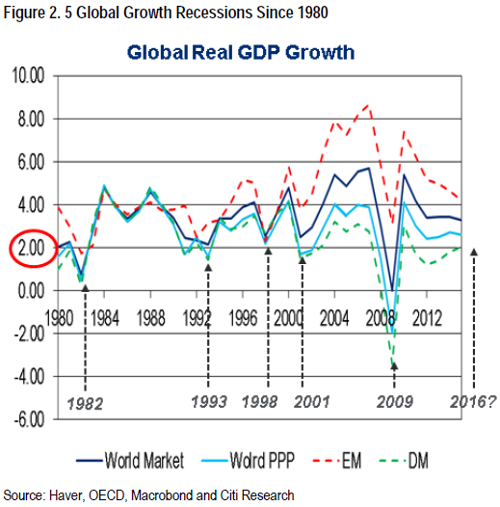Odds of China-led recession more than 50:50
18th September 2015 15:33
A six-year bull run for equity markets could be over if predictions of a global recession in 2016 prove accurate. Risk assets have struggled since April, held back by a trio of concerns – Greece, US interest rates and Chinese growth. Markets have priced in a whole load more risk since mid-August, and the spectre of a major slowdown in China, not rising US interest rates, remains easily the biggest threat to global economic growth; just ask Janet Yellen and her colleagues at the US Federal Reserve.
Deciding not to raise interest rates for the first time in almost a decade, American policymakers this week cited China as a key reason for its dovish stance. And well they might. The Organisation for Economic Co-operation and Development (OECD) has just cut growth estimates for China this year to 6.7% compared with 7.4% in 2014, falling to 6.5% in 2016. It also admits that China remains a puzzle. A sharp slowdown there mixed with financial turmoil might take two percentage points off domestic growth for two years, warns the think tank. That would cut global growth by 0.4% in 2016 and 0.5% the year after.
According to a recent survey of global investors by Barclays, more than 40% now see weak China/emerging market (EM) growth as the main risk to financial markets over the next 12 months. Over half also believed China-related assets were still expensive, despite a huge correction since June. Only one-in-ten think they're cheap, implying most anticipate further downside.
The liklihood the global economy goes into severe recession and financial crisis is 15%
Citigroup certainly does. A global recession starting in 2016, led by China, is now the broker's global economics team's main scenario. "Uncertainty remains, but the likelihood of a timely and effective policy response seems to be diminishing," says Citi's Willem Buiter.
"There remains considerable debate over China's economic prospects and the contagion risks, even among our own economics teams. However one thing is certain; that there is considerable downside risk to global growth with China as the most likely driver. This has been at the top of our list of key risks for over a year now."
It's a "high and rapidly rising risk," says Citi, which reckons there's a 40% chance of real GDP growth declining either to, or below, 2% by the middle of next year for only the sixth time since 1980 (see chart below) – the IMF currently expects 3.3% in 2015 and 3.8%. Growth then bottoms out in 2017 before recovering again from late 2017 or early 2018, predicts the broker.

In a worst case scenario, the global economy goes into severe recession and financial crisis. What's the likelihood? It's 15%, according to Citi, implying 55% probability of a recession of some kind. That said, there is a 15% chance that the global economy will enter a boom, and a 30% chance that it will avoid recession altogether and grow at a rate roughly equal to that of potential.
Like us, Citi questions the official growth rates coming out of China, which have tended to be understated during booms and underestimated during a slowdown. Citi's best guess is real GDP growth of 4% or less in 2015.
"The reasons behind China's downturn and likely recession are familiar: rising excess capacity in a growing number of sectors, excessive leverage in the private sector and episodes of irrational exuberance in asset markets," it says. "This is the classical recipe for a recession in capitalist market economies. This time is unlikely to be different for China. Policy options to prevent a recession exist but are, in our view, unlikely to be exercised in time."
Should emerging market economies enter recession territory, there will be inevitable consequences for developed markets. The larger economies will almost certainly grow more slowly than expected. "In terms of consensus revisions to 2015/16/17 real GDP growth estimates, the picture looks relatively benign in [developed markets] for the time being, though presumably 2016/17 could start falling if time moves on and policy responses are insufficient."
Could Citi be wrong?
Of course. By its own admission, there is still a pretty good chance a recession will not happen – 45% in fact. Others also cast doubt on negative assumptions.
Haitong Securities, the Chinese broker which bought investment bank Espirito Santo this year, admits that real estate investment at all-time lows and currency devaluation might suggest the Chinese economy is grinding to a halt. But it points out that this ignores the major shift taking place between the new and the old economy.
"We still see growth in the services and technology sectors, even while the painful restructuring hurts growth in manufacturing and resources," writes analyst Miranda Carr. "Too much fear masks upside potential from China's reform and new economy focussed sectors."
It's clearly too early to panic over Citi's doomsday forecasts, but certainly worth heeding the warning and watching the data like a hawk. Developed market trailing price/earning ratios are about 18 times right now compared with 16 times before the financial crash. That's not always an accurate signal of impending disaster, but as Citi admits, it is "unsettling".
This article is for information and discussion purposes only and does not form a recommendation to invest or otherwise. The value of an investment may fall. The investments referred to in this article may not be suitable for all investors, and if in doubt, an investor should seek advice from a qualified investment adviser.
Editor's Picks